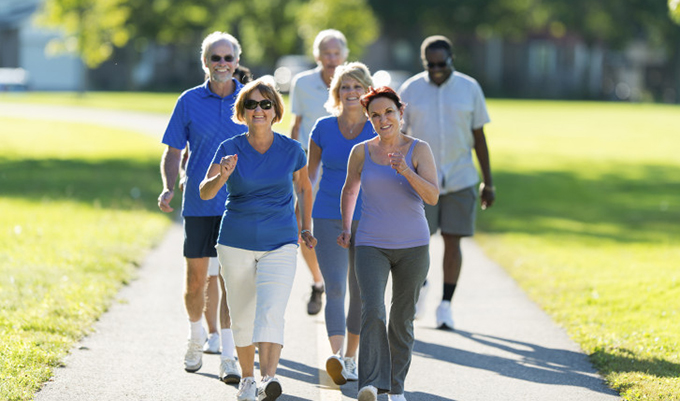

Social Health: Friends are the Secret to a Healthy Brain
by Brianna Rauchman
Social health plays a vital role in promoting overall wellness and longevity, especially for older adults. Learn 4 ways to strengthen your social health.
Social Health for Aging Adults
The effects of exercise, nutrition, and sleep heavily influence the healthy lifestyle discourse. While these factors are essential, social health – namely the relationships in our lives – is emerging as a key determinant for long-term wellness, notably for older adults.

Strong social connections, especially in person, provide support, comfort, and a sense of belonging, all of which help alleviate stress and improve mental health. Likewise, meaningful social connections encourage opportunities to enhance self-esteem and improve physical health.
Unfortunately, aging populations currently face a public health crisis: the loneliness epidemic. Due to physical limitations, sparse and diminishing social relationships, and a lack of access to technology, older adults endure a heightened prevalence of social isolation.
What is Social Health?
Social health describes our ability to form and maintain meaningful relationships within our communities, and adapt to novel social situations. With practice, we can strengthen these abilities which lead to elevated brain health, mental wellness and longevity.
5 key characteristics for social health include:

- Meaningful and positive relationships: The quality of your relationships to family, friends, and romantic partners.
- Healthy communication skills: The ability to effectively communicate with others and maintain positive relationships.
- Empathy and compassion: The capacity to comprehend and share the feelings of social companions, and to respond with benevolence and understanding.
- Adaptability: Remaining flexible in social situations and forming new social ties.
- Social support: A network of people to rely on for emotional and practical support.
Social Determinants for Wellness
Both introverts who prefer peaceful solitude, and extroverts with jam-packed agendas, benefit from optimized social wellness. In fact, the impact of social health has been extensively studied and documented by social and behavioral sciences. The latest scientific evidence reveals that social isolation in the elderly populating is linked to a 50% increased risk of dementia, as well as a 26% increased risk of all-cause mortality.

Likewise, strong social networks are associated with reduced levels of stress, improved mood, and a decreased risk of cognitive decline or dementia. A recent study from the Journals of Gerontology revealed that social engagement activates neural circuits and preserves brain volume in aging adults.
The science is clear: socialization plays a crucial role in maintaining holistic wellness and developing a community network, both of which are essential for personal health and collective success. Thus, investing in social wellness should be considered as a key component of comprehensive health.
4 Ways to Improve Social Health
Optimizing social engagement is a key factor for maintaining physical and mental health, as well as supporting longevity. Here are four specific strategies for improving your social wellness:

- Maintain positive relationships: Strengthen existing relationships with family and friends through regular communication (in-person or online) and shared activities such as art or yoga classes.
- Engage in community activities: Participate in community events, clubs, and volunteer opportunities to expand social networks, stay active, and meet new people with similar interests.
- Develop kind communication and conflict resolution skills: Effective communication and conflict resolution skills are critical for maintaining positive relationships and resolving conflicts that may arise. Individuals may attend workshops or seek therapy to improve these skills.
- Seek support from friends, family, and professionals: Having a supportive network of family and friends is especially important for older adults, who may face unique challenges as they age. Seeking support from professionals, such as guidance from brain health educators at Pacific Neuroscience Institute’s Lifestyle Program, can also be helpful in addressing social health issues and improving relationships.
What’s Next?

The importance of social wellness cannot be overstated, especially for aging adults. The benefits of meaningful social connections range from improved mental health, physical wellness, and cognitive function to a heightened sense of belonging, self-esteem, and self-development. By investing in social health, we can reap the rewards of increased longevity, meaningful relationships, and a happier, more fulfilling life.
It’s become essential to prioritize social health in our daily lives by building and maintaining positive relationships, engaging in community activities, seeking support from friends, family, therapists, and brain health trainers. By doing so, we can create a supportive network of individuals who enhance our wellbeing and provide us with the resources to thrive.
About the Lifestyle Program
The Lifestyle Program at Pacific Neuroscience Institute® can help strengthen your social health through research-backed education and training classes. Our innovative programs, offered both in-person and virtually, promote a proactive approach to elevating overall health, identifying cognitive changes, and intervening to maximize quality of life.
PNI’s Lifestyle Program offers a multimodal educational approach to optimize brain wellness by providing integrated and holistic guidance on how to preserve, improve and enhance cognitive brain fitness. Participants learn about memory training, nutrition, and combined physical and cognitive fitness (dual tasking). Our cross-platform programs are personalized for each client.
How to enroll in the Lifestyle Program
Virtual and in-person sessions are available. To learn more about participation, contact us: lifestyle@pacificneuro.org | 213-344-2037
Useful Links
- Lifestyle Program
- Pacific Brain Health Center
- Alzheimer’s Disease
- Dementia
- Mild Cognitive Impairment
Related Articles
About the Author
Brianna Rauchman
Brianna Rauchman, BA, is the Communications Coordinator for the Lifestyle Program, where she helps develop outreach strategies to connect with an expanding audience. Her responsibilities include providing launch support, developing content, assisting with collateral design, and planning social media strategies.
Last updated: November 6th, 2024



